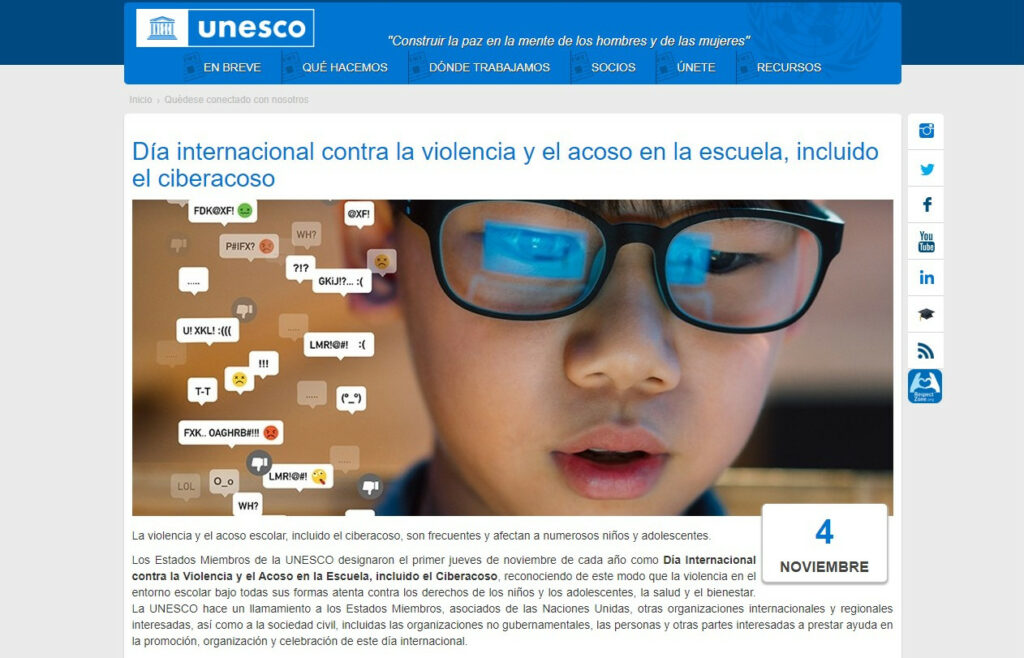Esta entrada también está disponible en: Aragonés Català Español Français English
INACTION
I have to tell you something. It’s not easy to tell. My mind has erased many of the details, but I remember that I was at recess at my school and I remember my classmate’s face very well. I don’t remember what happened, I don’t know what triggered the situation, but the more I think about it, the more chilling it is.
She was in the middle of the playground and many classmates started spitting on her. The spits were coming at her face, one after the other. I think the boldness of the first ones encouraged others to follow in their footsteps and spit too. I remember his red face and watery eyes covered with the saliva of the others and I remember him walking steadily towards the exit to get out of there as soon as possible.
I try hard to forget it. I can hardly bear the shame it causes me. I didn’t spit. I didn’t spit in her face, but I didn’t do anything to defend her either. I am deeply ashamed of that.
The truth is that even at that moment, I hardly understood the situation. I’ve always been very much on my own, and that day, probably one of many, I was also on my own. That’s probably why I don’t remember what brought us to that point.
I think about it all the time and one question comes to my mind: What difference does it make how it started? What could that 12-year-old girl have done to deserve the humiliation to which her classmates subjected her? What do you have to do at recess before you have no choice but to suffer dozens of spits falling on your face?
I don’t know about you, but I’m not convinced by any answer. If it’s hard for me to write it down, can you imagine the damage it must have done to her? Can you imagine suffering it yourself?
Unesco has designated one day as the International Day Against Violence and Bullying in Schools (read on to find out which one), but you go to school every day and I think it would be best if each and every day were an anti-bullying day. No one deserves it.
Description
Unesco designated the first Thursday of November every year as the International Day against Violence and Bullying at School, including Cyberbullying, recognising that violence in the school environment in all its forms (bullying) undermines children’s and adolescents’ rights, health and well-being. Unesco calls upon Member States, concerned international and regional organisations, as well as civil society, including non-governmental organisations, individuals and other stakeholders to assist in the promotion, organisation and celebration of this international day.
The aim is to raise awareness of the problem of online violence and cyberbullying and its consequences, and the need to stop it. It also calls on members of the educational community, authorities and related sectors such as the technology sector to pay attention to this problem to encourage them to contribute to the prevention of online violence, with a view to ensuring the safety and well-being of children, adolescents and young people.
Further information:

The content and objectives of this proposal partially coincide with those of the International Day of Education (24 January) and the Zero Discrimination Day (1 March).
In Aragon
In our autonomous community there is since 2018 an Aragonese Observatory for Coexistence and against School Bullying. It is a collegiate, consultative, advisory and participatory body, which aims to promote positive coexistence and the constructive resolution of conflicts that arise in the educational community, with special attention to situations of bullying.
There a telephone number against bullying: 900 100 456 set up by the Government of Aragon. It works 24 hours a day 365 days a year.
A detail
The Unesco page dedicated to this International Day offers parallel visions, related to the prevention of conflicts and bad practices in the classroom, The document on gender-based violence in classrooms is very interesting for going a little further.
A reflection
Goal 4 of the UN’s 2030 Agenda for Sustainable Development calls for inclusive and equitable quality education. This will be unfeasible as long as students continue to suffer discrimination or experience violence on the basis of actual or perceived gender identity and sexual orientation.
Unesco supports prevention and combat actions as education sector responses to homophobic and transphobic violence and harassment, whether physical or psychological. These responses must be strong responses from the educational community, but the basis lies in early education.
Suggestions for teachers
As it affects coexistence in the classroom and the normal development of the course, directly affecting the fulfilment of curricular objectives, the issue dealt with on this International Day has an obvious transversal nature and requires continuous attention in the classroom and in the centre.
Specific work is recommended in relation to aspects such as those mentioned in the previous paragraphs about gender-based, homophobic and transphobic violence and, of course, classroom work based on audiovisual documents such as the following:
- Do not play with me (10-14 years of age)
- Together against bullying
It also proposes the search and comment of news items related to bullying, not necessarily (or not exclusively) on specific events, but also on initiatives to neutralise and prevent the problem.
For example, reports and balance sheets (news in Heraldo de Aragón). Also, news about a meeting of assistant students for coexistence at IES Pablo Gargallo in Saragossa.
It is recommended not to lose contact with different campaigns that are presented periodically in the United Nations environment, mainly in relation to the Sustainable Development Goals.
This proposal reinforces the development of values that promote effective equality between men and women and the prevention of gender violence, and the values inherent in the principle of equal treatment and non-discrimination for any personal or social condition or circumstance, encouraging learning to prevent any type of violence and the peaceful resolution of conflicts. It also helps to promote and disseminate children’s rights in the educational environment.
It participates in methodological principles such as attention to the diversity of students and special attention to emotional intelligence, promoting a classroom and school climate that favours personal balance and personal relationships based on the fundamental values of coexistence, from the prevention of conflicts and the peaceful resolution of conflicts, as well as non-violence in all areas.
Objectives that this proposal helps to achieve
ESO:
- To responsibly assume their duties, to know and exercise their rights in respect for others, to practice tolerance, cooperation and solidarity among individuals and groups, to exercise in dialogue, strengthening human rights and equal treatment and opportunities between women and men, as common values of a plural society, and to prepare for the exercise of democratic citizenship.
- To value and respect the difference between the sexes and the equality of rights and opportunities between them. Reject discrimination against people on grounds of sex or any other personal or social condition or circumstance. Reject stereotypes that discriminate between men and women, as well as any manifestation of violence against women.
- To strengthen their affective capacities in all areas of their personality and in their relationships with others, as well as to reject violence, prejudices of any kind, sexist behaviour and to resolve conflicts peacefully.
Baccalaureate:
- To exercise democratic citizenship, from a global perspective, and acquire a responsible civic conscience, inspired by the values of the Spanish Constitution, as well as by human rights, which fosters co-responsibility in the construction of a just and equitable society.
- To consolidate personal and social maturity that allows them to act responsibly and autonomously and to develop their critical spirit. To foresee and resolve personal, family and social conflicts peacefully.
- To promote effective equality of rights and opportunities between men and women, to analyse and critically assess existing inequalities and discrimination, and in particular violence against women, and to promote real equality and non-discrimination of people for any personal or social condition or circumstance, with special attention to people with disabilities.
Subjects with which it can be linked
- Ethical values (ESO, 1st and 2nd cycles)
- Education for citizenship and human rights (ESO, 2nd cycle)
- Baccalaureate: To be assigned according to modality
Development of competences
- Social and civic competences
